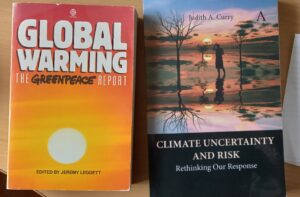 There has been something of an exodus from Twitter recently, especially from church bodies. The justifications and rationales have been rather entertaining to read, and have made me think of nothing more than the story of the Good Samaritan, specifically the religious authorities who pass by on the other side for fear of becoming contaminated. Whereas those who follow Jesus know that the contamination flows in the other direction…
There has been something of an exodus from Twitter recently, especially from church bodies. The justifications and rationales have been rather entertaining to read, and have made me think of nothing more than the story of the Good Samaritan, specifically the religious authorities who pass by on the other side for fear of becoming contaminated. Whereas those who follow Jesus know that the contamination flows in the other direction…
Which is why I’m staying; indeed, why I have now increased my subscription to the top level, so these articles will be on both the stack and Twitter (slightly tweaked for the latter so as not to fall foul of the algorithm). Let me unpack that a little.
Firstly, principally due to network effects and first-mover advantage, Twitter IS the village square for the world – at least the Western part of it. That’s the reality. All the purported rivals, like Threads, have fallen short because they cannot catch up. BlueSky will suffer the same fate (I’m on there but I hardly use it). Which means that if you need to find out what is happening, and most especially if you want to speak into that common conversation, this is the place to be.
Which leads to my second point, building on my introduction. Christians are not called to withdraw into holy huddles apart from the world – at least, not in general. There are some people who have that specific vocation, and they perform an absolutely essential role in the life of the church – we call them monastics – but for most people our duty is to to go out into the world bearing witness and sharing the good news about Jesus. So we need to do that on Twitter, indeed just as some have vocations away from the world, some might have vocations IN to the world. We need to embody the light, show different patterns of life, become the provocative people that make people ask ‘why do they do what they do?’ To withdraw from Twitter out of distaste for the owner is a bizarrely anti-Christian, anti-evangelistic mindset.
Thirdly, and the best thing about Twitter, it exposes you to disagreement – at least if you use it intelligently (and more on that below). The great blight of the last several decades, and of the last decade most of all, is the increasing polarisation of discourse and in particular the detachment of received opinion (consensus) from common sense. The starkest and most painful form of that resolved around questions of gender and transition, but the rot had spread so much wider. Scott Alexander has a very stimulating discussion of the underlying dynamics here. In his words, for there to be a productive conversation there has to be a Priesthood, there to guard good speech against bad speech. However, when a priesthood goes wrong – as in, when it ends up prohibiting the good speech – it can go very wrong indeed. We have been living through such a situation, and the only solution is to let light and air in on the conversation, in other words, to expose conversations and arguments to a much greater diversity of information and perspectives. It seems to me that most of the people withdrawing from Twitter are simply in shock that reasonable and moral people hold different views.
Which is why Elon Musk is a great man. I think he’s a great man for several reasons – I believe that he will succeed in colonising Mars – but his purchase of X is also of long-term significance (which is what I mean by a ‘great man’ – I don’t mean morally great, I mean someone whose choices have immense consequence for human life). The mainstream consensus, what I call the ‘bubble’, has gone very wrong – and, indeed, it continues to go very wrong. Here in the UK this can be seen with the appalling grooming gang scandal, not just the evils committed but in the (often unconscious, I hope) covering up that has followed. Musk turning a searchlight on to this situation is an immensely hopeful sign. The more people that are aware of what has happened, of just how bad it is – of how widespread, systematic and ongoing the religiously aggravated statutory rape of white working class girls is – the more likely it is that we will start to make the difficult decisions needed to ensure that it stops, and that the guilty are punished. Justice must be done, and justice must be seen to be done, and this cannot happen without a full and open conversation. I am now quite hopeful that, thanks to Musk, there will be a proper national inquiry.
So what is the best way to use Twitter? It is undoubtedly the case that Musk is using the platform as his own personal megaphone. Such has been the way of rich people through the ages – just think of Rupert Murdoch – but the great blessing of Twitter is that there is this remarkable option called ‘mute’. Unlike with, say, the Times (or Bezos’ Washington Post) the voice of the oligarch is not distributed and hidden between many different journalistic voices, giving the illusion of diverse opinion. No, here is the owner in all his idiosyncratic, chaotic, brilliant and contradictory glory. What you see is what you get. Alongside that there are also voices calling Musk a moron – and much worse. How often are there Times editorials saying that Murdoch is a plague and a pestilence?
Which points to the right way to use Twitter. Unlike a traditional newspaper, which can be a leisurely and sedate affair, using Twitter is much more like navigating the rapids in a canoe. So the first and most important thing you need is the canoe – which is the basic subscription (remember if you are not paying for a product then you are the product). To use Twitter without the ability to easily use lists (ie Tweetdeck) is to place oneself at the mercy of the algorithm, the swift flow of water over the rocks. It is still possible to use Twitter in this way, but it requires much more active suppression of content that you don’t want to see (ie blocking and muting). The algorithm, as a first approximation, is set up to maximise the time spent on the site, so if you have spent a few moments looking at a cute cat picture, you will then have many more cute cat pictures to look at. No doubt the AI will become more sophisticated over time, but you can bypass that delay by setting up lists, and lists are THE way to use Twitter intelligently (there may be even better ways that I’m unaware of).
The function of a list is to gather together the people that you wish to read under different headings. So I have a list composed of people that I know in real life; a list composed of the people that I most like reading, and which I read every day; I have a list for football writers, a list for Ukraine analysts, a list for my PhD research and so on. With a list, only the tweets from people that you have specifically placed on the list will appear. It is a completely ‘clean’ flow of information, there aren’t even any adverts if you pay at the appropriate rate.
Which means that when I read Twitter, which I do every day – and which has, to a very great extent, largely displaced my newspaper reading – I feel that I am in control of what I am reading, and I am left feeling both informed and challenged. Challenged? Yes, for one of my lists is of my fellow clergy, and it would be fair to say that I am out of step with the consensus political opinion on that list! It’s how I know that so many have left the site
Twitter is a tool, and it rewards the expertise with which it is used. It is an optional extra to life – as are newspapers generally – but if you want to be informed about the world and, even more, if you want to speak into the conversation that is shaping the world, Twitter is essential. It is not the only tool (I’m a great devotee of RSS feeds too), and there are some tasks it cannot do, but I really enjoy using it – so here I stay. It really suits me.






You must be logged in to post a comment.